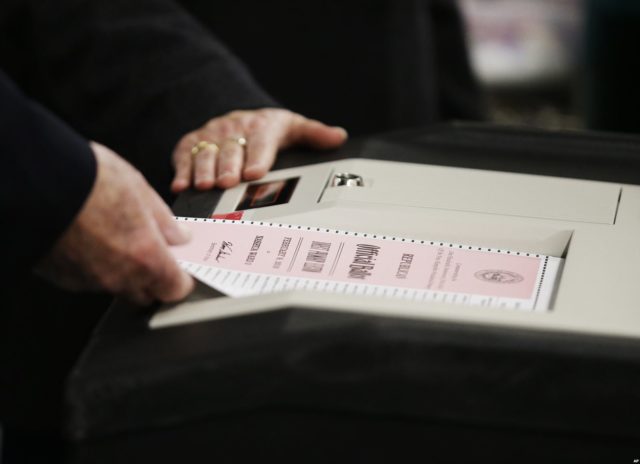
Dead woman among New Yorkers signed up for posts in Brooklyn’s Democratic Party A ballot is entered into a machine. (Voice Of America/Released)
Alfreida Davis, a housing activist and lifelong Brooklyn resident, died following brain surgery complications on Nov. 1, 2020.
So it came as a shock for her family members to learn last week that on Dec. 1, 2020 — a month after Davis’ death — a district leader in Coney Island filed an official form signing up the late matriarch for a seat on the Brooklyn Democratic Party’s county committee.
“I don’t know how or why her name was used in this way,” Cheyenne McGregor, Davis’ granddaughter, told the Daily News on Friday after being informed of the 2020 filing. “I find it disturbing.”
The inclusion of Davis’ name on the form, submitted by Dionne Brown-Jordan, the district leader of southern Brooklyn’s 46th Assembly District, is believed to be part of a ploy by the borough’s Democratic Party brass to exert outsize power over internal party operations by stacking its committee with unwitting individuals, according to critics.
Brown-Jordan’s form, which was obtained by The News and has not previously been reported, also included the names of at least three other Brooklyn residents who said in interviews that they were never informed of their committee appointments.
Among them was Caroline Mickelsen, a 92-year-old retired actress who lives in Bay Ridge.
“I don’t know why it is. I shouldn’t be on there at all. I wasn’t told about it,” said Mickelsen, noting that she used to be involved with the Brooklyn Democratic Party, but that she hasn’t been active for years due to advanced age.
In Davis’ case, McGregor said the party honored her late grandmother in a December 2020 Zoom call to commemorate her life and work in housing activism — meaning they were aware she was no longer alive.
“It’s odd, of course,” she said.
The revelations about Brown-Jordan’s 2020 filing come on the heels of a report from the news organization The City finding that the Brooklyn Democratic Party submitted Board of Elections petitions to fill committee vacancies that included the names of at least 20 individuals who said they were nominated without their consent. Those petitions were circulated on behalf of Brown-Jordan and Michael Silverman, her male district leader counterpart.
In addition to serving as a district leader, Brown-Jordan is the Brooklyn Democratic Party’s assistant treasurer. She filed the 2020 form to fill dozens of vacancies on the party committee, which comprises roughly 4,000 unpaid individuals tasked with voting on party rules and picking nominees for some local elections.
Brown-Jordan, who’s challenging Brooklyn Assemblywoman Mathylde Frontus in this year’s Democratic primary, did not return requests for comment last week. Brooklyn Democratic Party Chairwoman Rodneyse Bichotte Hermelyn, who spearheads the party and serves with Brown-Jordan on its executive committee, did not return a request for comment via a spokesman.
In the case of Brown-Jordan’s 2020 submission, the slate of candidates she presented was approved by the party during that year’s full county committee meeting on Dec. 23, according to a press release from the time.
As a result, despite being dead, Davis was used as a “proxy,” meaning she automatically cast the same votes as Brown-Jordan to approve other party vacancies and adopt five new amendments to party rules during the meeting, a source with knowledge of the matter said.
McGregor was aghast about her dead grandmother being used as a proxy.
“She deserved better in life, and certainly deserves nothing but peace and honor in her rest,” she said.
The automatic proxy process extended to any members who weren’t present for the virtual December 2020 meeting under an emergency rule enacted due to the COVID-19 pandemic.
Mickelsen, the 92-year-old Bay Ridge resident, said she also did not attend the meeting, where she was likely used as a proxy. The two other unwitting committee appointees who spoke to The News, Noah Weston and Bill Engfer, said they were not present, either, since they didn’t even know they were being nominated.
Tony Melone, a county committee member since 2018 and the communications director of the New Kings Democrats, an insurgent group within the Brooklyn Democratic Party, said it appears party leaders are using the proxy system to “fraudulently” expand their influence.
“They can use that as leverage in votes,” Melone said. “It feels like the party leadership is more interested in collecting proxy votes so that they can decide what happens more than they are in engaging with party members who actually want to participate.”
A 2021 decision from one of New York’s top courts in an unrelated case suggests that using unwitting people for political purposes without their consent, if done deliberately, could run afoul of the law.
The decision in Ariola vs. Maio, issued by the Appellate Division of the state Supreme Court’s 2nd Department, tossed ballot petitions from several New York City political candidates because it found they “were permeated with fraud.” The list included names of people “who never affirmatively agreed to be listed thereon.”
Weston, a Brooklyn community activist affiliated with the New Kings Democrats, said it’s especially ironic that Brown-Jordan included his name on her 2020 filing because he’s mounting a challenge against her in this year’s primary election for the district leadership.
“The party machine is embarrassingly corrupt and comically incompetent,” he said.
___
© 2022 New York Daily News Distributed by Tribune Content Agency, LLC




